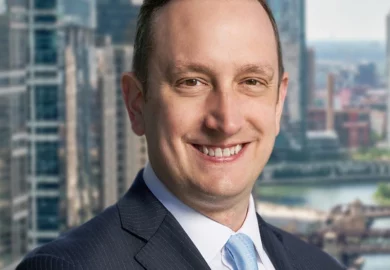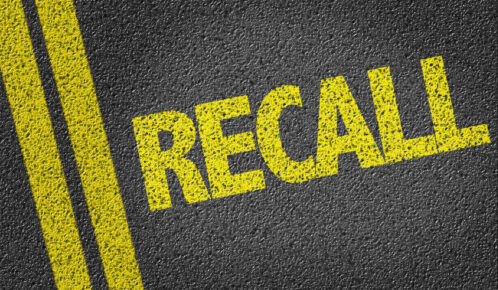Thanks to Ankin Law attorney Josh Rudolfi, a truck driver with an injured spine and two injured knees was awarded a favorable settlement in arbitration. The arbitrator found that the driver, whose semi-truck was broadsided at an intersection, is entitled to receive much needed bilateral knee surgeries and cervical medial branch blocks. Rudolfi was also able to ensure that his employer, Lakeshore Beverage pay for all post-operative care. In addition, Lakeshore Beverage must pay all past medical services totaling $23,560.04.

(Read the Full Arbitrator Decision Here)
The Accident
The injured trucker has worked for Lakeshore Beverage as a semi-truck driver for the past 32 years. As a driver he makes deliveries and unloads pallets from his trailer using an electric pallet jack. On the day of the accident he was returning to the Lakeshore Beverage warehouse when his semi-truck was struck by an SUV that ran a red light. The trucker testified that he was in the middle of an intersection when the SUV “t-boned” him. He testified that he struck both his knees on the dashboard and felt pain in both knees, his back, and his neck. He immediately reported the accident to his company. The accident and notice were not in dispute during the arbitration.
The trucker testified that Lakeshore Beverage sent him to “C” medical center. During the visit to C he reported being involved in the motor vehicle accident, striking his knees on the dash. He complained of pain primarily in the left knee along with the upper back, left shoulder, and back. He was referred to physical therapy and allowed to continue to work full duty. He followed up at C a few days later and indicated his pain was getting better but he was still noted to be limping. He was instructed to continue working full duty and continue physical therapy.
Treatment History
Due to continued pain he sought a second opinion with Pain Specialists (PS) ten days after the accident. He reported being involved in the accident indicating that he struck both of his knees on the dash and his body jerked, causing pain to his neck and back. His physical exam revealed tenderness in both knees and his neck. He was sent for physical therapy and kept on full duty work. The doctor also noted, “I feel that the injuries reported in today’s visit are causally related to the injuries sustained during the accident.”
The injured driver underwent a course of physical therapy at PS but due to continue pain, he was referred for bilateral MRIs of the knees. An MRI of the right knee performed revealed a grade 2 ACL sprain, quadriceps femoris tendinosis vs. partial tear, post-traumatic Hoffa’s fat pad impingement, and grade 4 chondromalacia patellae. An MRI of the left knee revealed an MCL partial tear, medial meniscus tear, an interstitial tear of the quadriceps, and various ligament sprains.
He followed up at PS and continued to complain of 3-4/10 neck pain, 7/10 left knee pain, and 6/10 right knee pain. His physical examination was positive for facet loading in the neck, and his valgus/vargus tests were positive bilaterally in the knees. At this point he was recommended for cervical facet joint injections, but refused them. He was also referred to an orthopedic surgeon due to the multiple partial-thickness tears seen on the MRIs of the knees.
A little over 3 months after the accident he was seen by orthopedic surgeon Dr. S at PO. He reported bilateral knee pain, left greater than right. He denied any prior history of knee issues. Physical examination of the knees indicated positive anterior drawer and Lachman testing. Dr. S reviewed the MRIs and indicated that he had a medial meniscus tear on the left, and a small medial meniscus tear on the right. For these conditions, Dr. S recommended bilateral meniscus repairs, starting with the left knee first. The trucker testified that he continued to follow up with M approximately once per month following the surgical recommendation from Dr. S.
Six months after the accident Lakeshore Beverage sent him for an Independent Medical Examination (IME) with Dr. F at MO. Dr. F noted a history of injury consistent with the trucker’s testimony and all his other medical records. Dr. F performed a physical examination and opined that the injured truck driver had resolve bilateral knee contusions that were causally related to the work accident. Dr. F noted that he believed the MRIs were both negative for tears and indicated that the injured truck driver was at maximum medical improvement and required no further medical care.
The injured truck driver followed up with the pain specialists 11 months after the accident and was referred for left C5-C7 medial branch blocks due to continued pain in the neck. He testified that if the Arbitrator were to award the recommended surgeries that he would have them performed immediately. He testified that prior to the accident he never had any issues with either knee, nor sought treatment for either knee even after working for the Lakeshore Beverage for 32 years.
Later, he followed up with Dr. S who noted bilateral medial joint line tenderness and positive medial McMurray’s signs bilaterally, left worse than right. Dr. S also reviewed the IME report re-reviewed the MRIs. Dr. S noted that both he and the radiologist who reviewed the MRIs disagreed with Dr. F’s assessment that the MRIs were normal. Dr. S and the radiologist both noted acute changes on the right and left knee MRIs, noting specifically a medial meniscus tear on the left along with a partial MCL tear. Dr. S again recommended bilaterally meniscus repairs (with possible ACL repairs depending on the intra-operative findings) starting with the left knee.
The injured trucker says he continues to have pain in his knee and back and continues working full duty because he has bills to pay. He denied ever having treatment for his neck prior to this accident. He continues taking Tylenol for his pain.
CONCLUSIONS OF LAW
Causal Connection
The Arbitrator finds that the injured trucker’s current condition of ill-being is causally related to his undisputed April 30, 2024 work accident. PS noted in every visit (starting on May 10, 2024) that they believed his conditions were causally related. Dr. S noted in both visits that the injured trucker had no history of issues with either knee. Even Respondent’s own IME doctor, Dr. F, opined that his current condition of ill-being is causally related to the work accident. Further, the medical records are all consistent in terms of mechanism of injury. Accordingly, the Arbitrator finds that the injured trucker’s current condition of ill-being is causally related to the undisputed work accident.
Medical Bills
The Arbitrator finds that the injured trucker’s medical care has been reasonable and necessary and that Lakeshore Beverage has not paid all appropriate charges. Since being injured in the undisputed work accident the truck driver has undergone a conservative course of treatment consisting of office visits, physical therapy, and prescription medication/topicals. Lakeshore Beverage’s IME doctor even opined that all treatment has been reasonable and necessary. The Arbitrator agrees and finds that the injured truck driver’s medical care has been reasonable and necessary. Further, he has introduced bills reflecting a total balance of $23,560.04 for this medical care. These medical bills are therefore awarded to the injured driver, to be adjudicated pursuant to the Illinois Medical Fee Schedule.
Prospective Medical Care
The Arbitrator finds that the injured trucker is entitled to prospective medical care in the form of bilateral knee arthroscopies and cervical medial branch blocks. With regard to the bilateral knee conditions, there is no dispute that the conditions are causally related to the accident.
The issue in this matter is whether or not the injured trucker requires further medical care. Dr. S and the radiologist both read the MRIs as revealing meniscus tears bilaterally, and an MCL tear on the left side. Dr. F noted in his report that he also reviewed the images and opined that they revealed degenerative changes, with no acute meniscal or ligamentous injury. Both Dr. S and the 5 radiologist disagree with this review. The Arbitrator finds that the opinions of Dr. S and the radiologist are more persuasive and adopts them. Accordingly, the recommendation for bilateral knee surgery is reasonable and necessary in light of the objective medical evidence revealed on the bilateral knee MRIs. Accordingly, the injured trucker is awarded bilateral knee arthroscopies along with all reasonable and necessary post-operative care.
With regard to the cervical spine M has recommended left-sided medial branch blocks from C5-C7 and noted in each visit that the injured trucker’s injuries were caused by the undisputed work accident. There is no countervailing opinion. Therefore, the Arbitrator awards these medial branch blocks.




